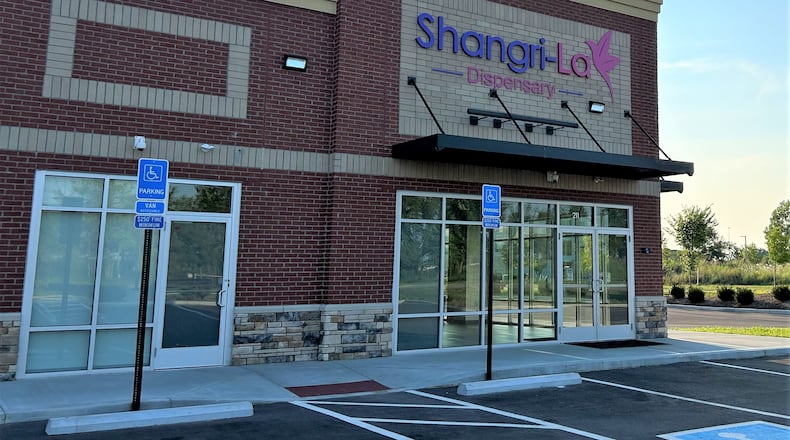There are four medical marijuana businesses planned in the city, and two are open, city leaders said. The ordinance has no impact on the dispensaries that are open or those in the planning stages, they said.
During Tuesday night’s council meeting, members said they talked to their friends and Monroe residents who said they wanted the city to limit the number of medical marijuana businesses.
At an earlier meeting, council member Michael Graves said he was concerned the city could become the “Las Vegas strip of weed dispensaries.”
Council member Dr. Kelly Clark, a veterinarian, said the issue should be decided by Monroe residents at the ballot box. She said the “scientist” in her prefers “a big sample size” than those who have talked to council members.
“I have not heard from enough residents,” she said. “The ballot is the best place.”
When it became clear Clark was the only council member with this opinion, she said: “I’m happy to stand alone.”
Council then asked City Manager Bill Brock and staff to draft legislation that members can vote on at their next meeting on July 25.
Once all four dispensaries are operational, Monroe, with a population of 15,412, will have one marijuana business per 3,853 residents, the highest rate in the state.
The only Ohio cities that will have more dispensaries than Monroe are Columbus (15), Cincinnati (11), Cleveland (5) and Dayton (5). Monroe is tied for fifth with Canton that has a population more than four times larger at 70,872.
Tom Smith, development director, said city staff recommended the following:
- Establish a policy regulating zoning, licensure, and processes for medical marijuana facilities within city limits.
- Medical marijuana facilities be permitted to operate as a conditional-use only in specified zoning districts.
- The amount of retail dispensaries within the city be restricted to four structures.
- As provided by Ohio revised code, limitations on the number of cultivators, processors, or retail dispensaries by localities, incorporate a clause that council, at their option, may: reduce the number of dispensaries allowed from four to three in the event that a dispensary ceases to operate or relocates outside the city; or that the number of dispensaries allowed automatically default to council’s desired amount (i.e., from four to three or four to two in the event that a dispensary ceases to operate or relocates outside the city limits.
- Assess a fee schedule.
Dispensary guidelines throughout the region
- City of Hamilton: The city of Hamilton Codified Ordinances prohibits the cultivation, processing, or retail dispensary of any medical marijuana. This ordinance was passed on Dec. 20, 2017.
- City of Middletown: On Feb. 21, 2017, the city of Middletown adopted Ordinance 2017-07 prohibiting the cultivation, processing, and retail dispensary establishments within the municipal limits of the city. As of June 9, 2023, Middletown is considering revoking the ordinance to permit the sales of medical marijuana.
- City of Fairfield: On April 24, 2017, the city of Fairfield passed Ordinance 33-17 prohibiting cultivation, processing, and retail dispensing of medical marijuana within its corporate limits.
- City of Trenton: The city of Trenton originally had an ordinance prohibiting medical marijuana dispensaries. As of December 2021, that ordinance has been repealed and the code allows dispensaries as a conditional use.
- West Chester Twp.: On Jan. 23, 2018, West Chester Twp. adopted Resolution 04-2018 prohibiting the cultivation, processing, and retail dispensing of medical marijuana within the township.
- Liberty Twp.: On March 8, 2017, Liberty Twp. amended its zoning resolution to prohibit the cultivation, processing, and retail dispensing of medical marijuana in all zoning districts.
- City of Oxford: The City of Oxford permits medical marijuana dispensaries as a retail use without any additional regulations beyond what the state requires. On Feb. 9, 2023, the dispensary, Consume Oxford, opened making it the first dispensary in Oxford. Oxford plans to open a second dispensary, Inspire Cannabis, later this year with construction of the site in progress. The city has not had any cultivation or processing facility proposals.
- City of Franklin: The city passed an ordinance prohibiting medical marijuana cultivation, processing, and dispensary activities. The ordinance went into effect on April 6, 2023.
- City of Lebanon: In January 2022, the city of Lebanon enacted a six-month moratorium on granting medical marijuana dispensary permits. The moratorium expired in August 2022. The council extended the moratorium another six months after a new rule from the Ohio Board of Pharmacy allowed an increase in the number of dispensaries from one to seven in its district, which includes Warren, Clinton and Clermont counties. The city has one dispensary, About Wellness Ohio, and has not created any issues for the police department. On Sept. 13, 2022, City Council approved Ordinance 2022-095 amending the zoning code text to: Permit dispensaries as a conditional use in the General Commercial District; Limit the number of dispensaries allowed in the city to two; prohibit recreational use dispensaries; allow cultivation and production facilities in the city’s industrial use zones only; provide use specific guidelines for facilities; and add marijuana related definitions to the zoning code.
- City of Mason: On Jan. 22, 2018, the city of Mason approved Ordinance 2017-139 prohibiting medical marijuana cultivation, processing and retail dispensaries in any zoning district, overlay or PUD.
SOURCE: Presentation from Tom Smith, city of Monroe’s development director
About the Author

